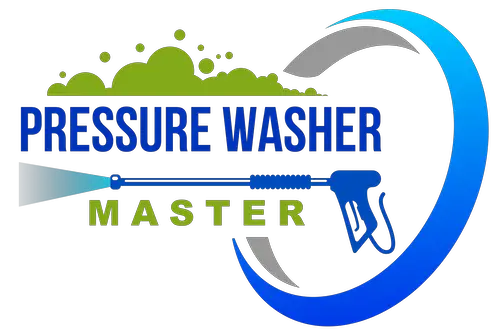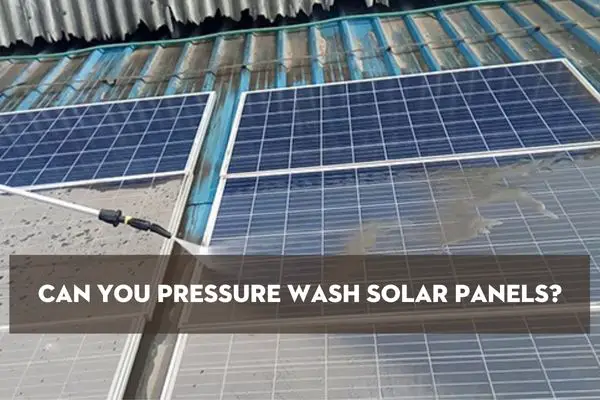For supplying household energy demands, solar panels are becoming more and more common. They produce a current that is transformed into useful power by absorbing solar energy. Solar panels are less cost-effective if they are dirty, since the energy generated depends on the sunlight’s exposure.
In rainy places, the cleaning and maintenance of solar panels are often minimal. However, filth can still accumulate over time, even if you rely on the rain to clean the panels for you.
So, the question is, “Can you pressure wash solar panels?” You can, but you shouldn’t as you may risk damaging your panels. Read to find out why.
Can You Pressure Wash Solar Panels?
If you decide to clean your solar panels yourself, you could find that some stains, like bird droppings, are particularly difficult to remove. Bird droppings can be baked onto the surface of solar panels due to their extreme heat. The pressure washer could be the first thing that comes to mind. But it is obvious that solar panels were not intended to withstand such water pressure.
According to research and solar panel manufacturers, the optimum method for cleaning solar panels is a low-pressure and soft bristle mechanical wash.
What Happens When You Pressure Wash Solar Panels?
Paint Damage
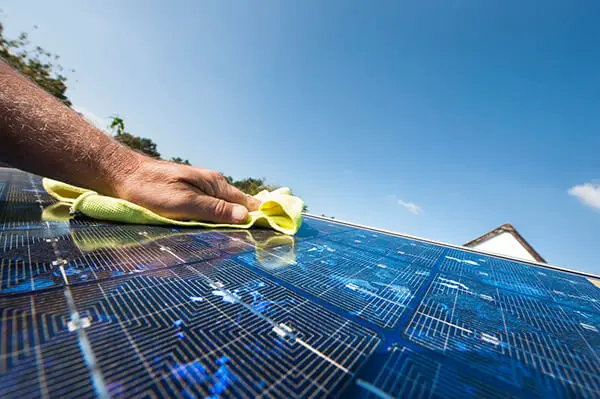
The protective coating that shields the metal frame of solar panels from the environment may come off under intense pressure. They may even begin to separate from the glass panes over time with adequate pressure, exposing them to environmental factors and the risk of some irreversible damage, like rust and corrosion.
This damage may decrease the value of the solar panels if you want to resell them. Over time, it may also cost you a fortune to fix them and lengthen their useful life.
Warranty Denied
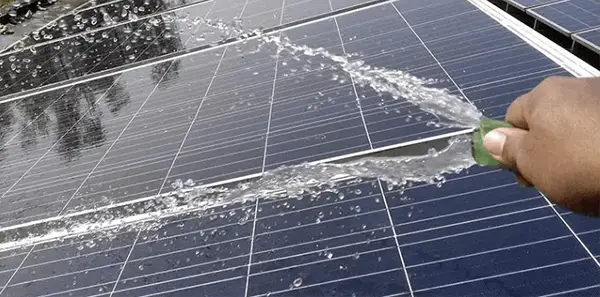
The majority of solar panel manufacturers recommend avoiding pressure washing solar panels, and for some, doing so would even void their warranties. This is because of the aforementioned factors as well as a concern that high pressure would cause water to penetrate between the glass panes and onto the PV system, shattering the vacuum seal.
Overspray
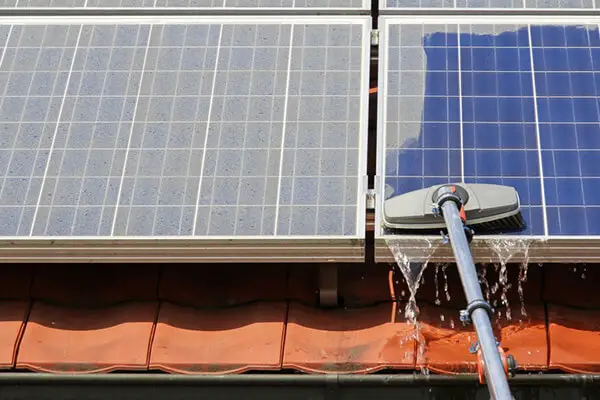
Overspray is a potential problem while pressure cleaning solar panels. Pressure washing roofs has slowly come to light as a problematic cleaning technique. Almost every type of roofing material that can be pressure washed has shortcomings.
If the water is not oriented properly, it might shoot water below your roof and destroy the outer coatings on composite, tile, and clay roofing, which could persist for years. If there are other cleaning options available, they should be used instead of over spraying solar panels while pressure washing them.
How To Clean Solar Panels
Solar panels may be cleaned using various techniques, including fully automated systems and hand cleaning. Rainwater is able to wash away some of the dirt that builds up on solar panel surfaces over time, but it can also cause dirt to gather at the bottom of the panels and is insufficient to eliminate serious pollution.
Brushes and Sponges
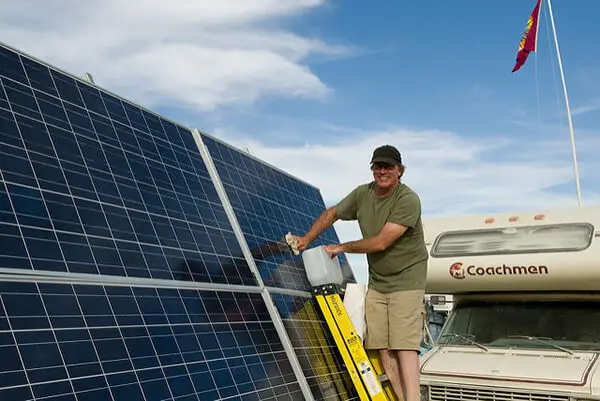
Instead of using soap, which leaves a residue that not only shades panels but also attracts dirt, solar maintenance companies like the US-based Bland Company and Premier Solar Cleaning have discovered that using deionized water with a rolling or vehicle-mounted brush can effectively clean solar panels.
A Solar Panel Wash from lubricant producer Polywater helps water take off dirt without leaving a trail behind. Another way to get rid of filth is mixing diluted vinegar with hydrogen peroxide.
Additionally, house owners may manually clean their solar panels with a garden hose and a soft sponge without the need for any cleaning solutions.
Soft Wash
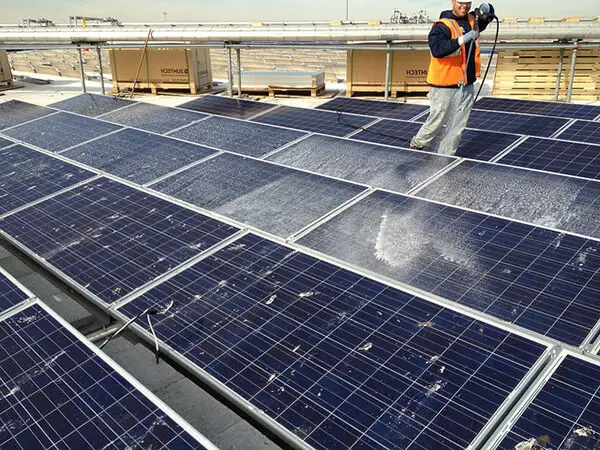
The old-fashioned method of manually cleaning the PV panels works well. Despite being inventive and effective, technologies like robots, waterless vibration, or unique coatings can also be highly costly and ineffective in some circumstances. This is particularly true for modest installations that are either residential or commercial in scope, as well as for unique buildings and installations.
When soft wash solar panels, there are a few tools that will be very helpful in getting the job done correctly. On the one hand, the soil is removed from the panel using a variety of specialized brushes that revolve. We might also use any straightforward cleaning tool, such as the ones used on automobile windshields.
On the other hand, using water pressure machines such as the Karcher High-Pressure Washer would allow us to complete the task much quicker while saving lots of water.
What Are Some Tips For Cleaning Solar Panels?
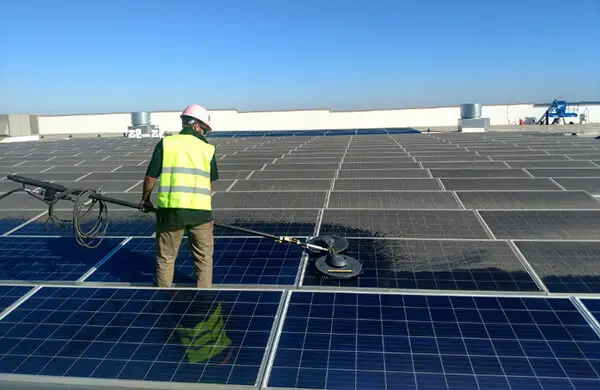
- Cooler days are preferable for washing solar panels since they reduce the possibility of glass shattering when the water dries.
- Solar panel washing using an abrasive and powerful detergent is not advised. The glass of solar panels may be easily cleaned at home using a mixture of one part vinegar, one part mild, non-abrasive detergent, and eight parts water.
- Before cleaning, solar panels must be switched off, and the underside must never be touched.
- Wearing gloves and using extension tools to clean solar panels from the ground is the safest method. Homes with a second or third story, however, could necessitate scaling the roof.
- If a homeowner is doubtful of their capacity to safely clean their solar panels, they should think about hiring a local solar power expert to do it instead.
Watch this video for more tips and guides:
Conclusion
Can you pressure wash solar panels? The answer is no, but you can apply the other techniques mentioned to clean your panels yourself without having to call professionals.
If your solar panels are coated in dust, dirt, or grime, your solar power system’s production may decrease in quality. It’s vital to keep your solar panels clean and debris-free in order to get the full cost-saving benefits of solar electricity.
